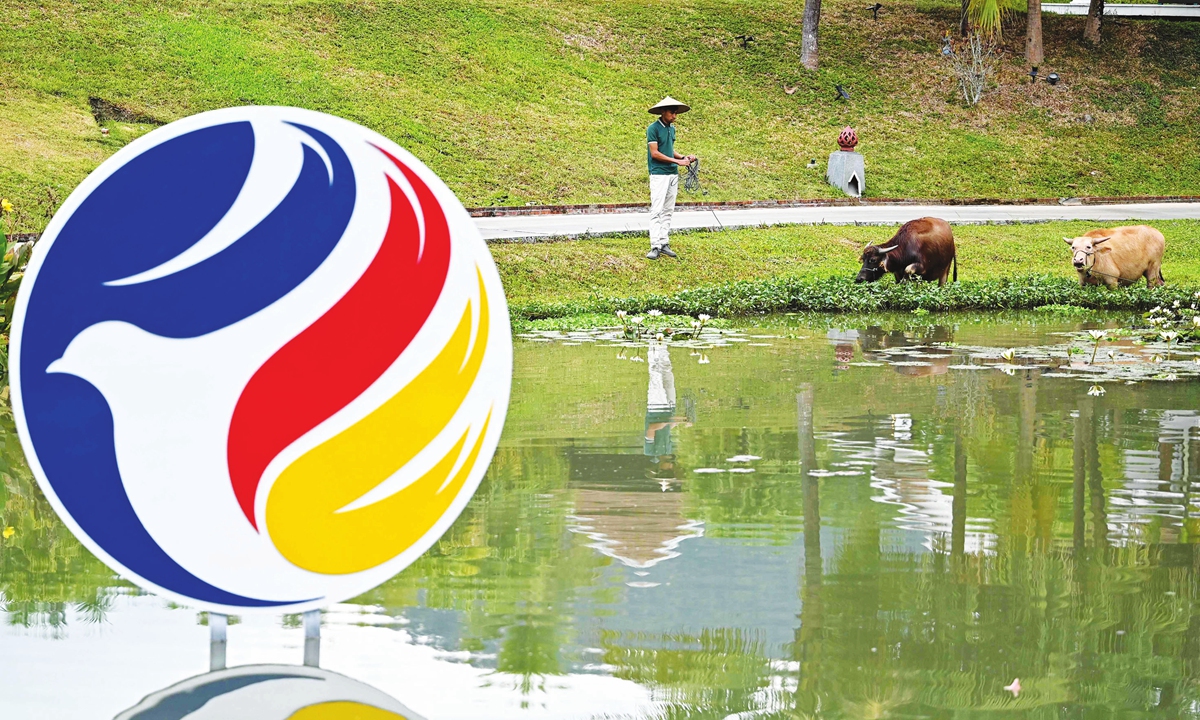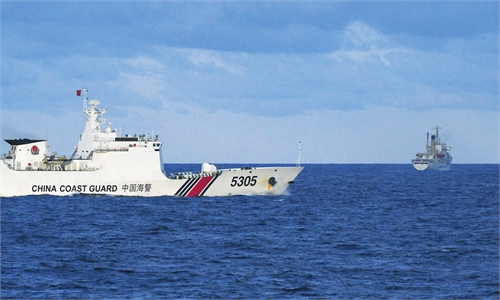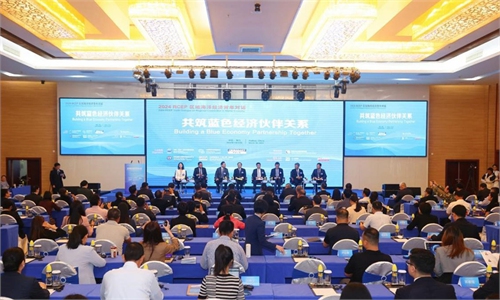
A man feeds water buffaloes near the ASEAN logo during the ASEAN Foreign Ministers' retreat meeting in Luang Prabang on January 29, 2024. Photo: VCG
Editor's Note:The escalation of the China-Philippine tensions raises concerns among their neighboring countries in the South China Sea. How will the Philippines' provocations, instigated and supported by the US, affect the situation in the South China Sea in 2024? How do other ASEAN member countries perceive the South China Sea tensions? Why do they hope that the situation will be contained?
In our "ASEAN Perspective on the South China Sea" series, we collect wisdom and insights from former diplomats and scholars from ASEAN member countries. Dato' Abdul Majit bin Ahmad Khan (Dato' Abdul Majit), president of the Malaysia-China Friendship Association, honorary president of the Malaysia-China Chamber of Commerce, former director general of ASEAN and former Malaysian ambassador to China, shared his insights with Global Times (GT) reporters Li Aixin and Guo Yuandan.
GT: There was a period of calm in the South China Sea. However, since 2023, tensions have been escalating, mostly between China and the Philippines. Where do you think the tensions are headed?
Dato' Abdul Majit: There has always been the intention of ASEAN, China and also other countries to ensure that the South China Sea remains a region of peace and stability. It's in our interest that things should not get toxic, because then it will affect our development efforts and the harmonious relationship that we have built, as you mentioned, over the past years.
It's my hope that all countries will use their wisdom to ensure that the conflict or the crisis does not get out of hand.
GT: Now that the US seems to be proactively interfering in the South China Sea affairs, with more joint patrols, joint exercises and an upcoming joint summit with the Philippines, some observers say the US is making the Philippines its spokesperson in ASEAN. What is your take on this view?
Dato' Abdul Majit: From my understanding, the core tenet of ASEAN is its non-aligned principle of neutrality. ASEAN is a collective entity, which refrains from taking sides. I think this is respected by almost all ASEAN leaders. There's no necessity for ASEAN to appoint a spokesperson that represents an external power, including the US.
ASEAN remains committed to ASEAN centrality in the sense that ASEAN wants to be the primary decision-makers in safeguarding the region's welfare. There are genuine concerns about increasing external powers' involvement that could undermine this principle.
GT: Against the backdrop of the increasing US interference in regional affairs, how would you evaluate the opportunity for South China Sea affairs to return to the track of settlement through dialogue and consultation?
Dato' Abdul Majit: I think the Philippines has its own concerns and the Chinese have their own concerns. In the past, there was a consensus to keep the South China Sea away from becoming explosive. The ASEAN member countries should continue to find a way, and continue the dialogue, which started many years ago. We should not retract on this.
GT: You have served as the Malaysian ambassador to China for nearly 10 years and have a deep understanding of China. Do you think China is a country that tends to advocate the use of force?
Dato' Abdul Majit: No. China has, since its reform and opening-up, committed to good neighborliness. China has contributed to ASEAN growth. The foundation of ASEAN-China dialogue relations has been very strong. China has been a very active participant in this dialogue and cooperation effort. China has been respectful in this regard. In disputes, I don't think it's in the interest of China to turn to force.
But at the same time, it's important that while China has been a contributor to ASEAN growth, it also must be sensitive to the countries in the region, because China is surrounded by small countries.
GT: This year marks the 50th anniversary of the establishment of diplomatic relations between China and Malaysia. What role do you think China-Malaysia ties could play in promoting the peaceful resolution of the South China Sea issue?
Dato' Abdul Majit: The South China Sea issue should not affect our bilateral cooperation or interaction. It is separate from the development of our overall bilateral relations. Looking back at the last 50 years, the Malaysian generation has been transformative. We started on a modest base of cooperation. Today, we embrace the comprehensive strategic cooperation level where cooperation encompasses all sectors, including economy, trade, culture, people-to-people exchanges, as well as other areas regarding regional and international issues. Our leaders have reaffirmed their commitment to further deepen and expand bilateral relations in the years to come, I'm very optimistic that our two countries will reach new heights in our relations and cooperation.
GT: Since the beginning of this year, Malaysian Prime Minister Anwar Ibrahim has stated multiple times in public that Malaysia is not interested in taking sides between China and the US. Why are Malaysia and the Philippines so different in their diplomacy?
Dato' Abdul Majit: Unlike the EU, ASEAN does not have a centralized foreign policy approach. Individual member states are free to pursue their own direction. In the case of the Philippines and Malaysia, differences could come from our different historical experiences and different national interests. Coming to the issue of the South China Sea, I believe all ASEAN member countries and China want to see peace in the region so that we can pursue development for our people.
GT: President of the Philippines Ferdinand R. Marcos Jr is to give a keynote address at the IISS Shangri-La Dialogue 2024. Judging from the development of the situation, observers say Marcos Jr will very likely hype up the South China Sea issue and point the finger at China. What do you think China should do to win more audiences?
Dato' Abdul Majit: The Philippines has its concerns. I'm not surprised that the Philippines will make use of the opportunity to push this case. Equally, it is an opportunity for China to tell its story. Countries will continue to communicate to share their positions. But we do not want it to lead to tensions and unnecessarily increase the complexity of the issue.
This is something for both China and the Philippines to work out. But as a member of ASEAN, we look forward to both countries coming back again [to the negotiating table], sitting down and seeing how the issues can be tackled for the stability and the continued friendship of ASEAN and China and also for the region.
GT: Apart from the US, we are seeing an increasing number of NATO countries enhancing their engagement in South China Sea affairs, including the UK and France. There are concerns that some Western countries are attempting to insert NATO into this part of the world. How do you view the possibility of NATO's Asia-Pacificization?
Dato' Abdul Majit: The formation of the so-called Asian NATO would be a negative development for the region. It would clearly undermine ASEAN's long-standing position that the region be free from the military presence of external powers. Rather than stabilize the region, it would more likely exacerbate the situation.
GT: In a previous interview, you said that the 21st century is undergoing a profound geopolitical reconfiguration, as we witness the evolution of a once Western-centric world order turning into a more pluralistic global landscape. When the US steps in the South China Sea affairs, is it a move of resisting the emergence of a pluralistic global landscape?
Dato' Abdul Majit: What we see today is a transition of power, and this inevitably involves risk influence on both sides. A superpower seldom wants to relinquish its dominance without resistance. In my opinion, the South China Sea dispute can be viewed as a component of this intricate reconfiguration of global power dynamics. While tensions persist, war is avoidable. Our focus should remain on fostering a peaceful transition from the current Western-centric world order to a more inclusive and representative order.
GT: The world continues to witness ongoing wars in the Middle East and Europe. What experiences and lessons do you think countries in the South China Sea should take away from these conflicts?
Dato' Abdul Majit: The take-away is that war has very devastating consequences - the suffering of the people, the instability, the chaos. The lesson for us is that we should prevent war at all costs, not just in South Asia, but around the world.


